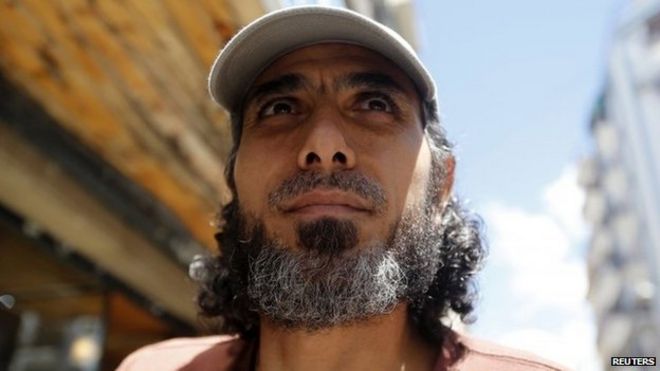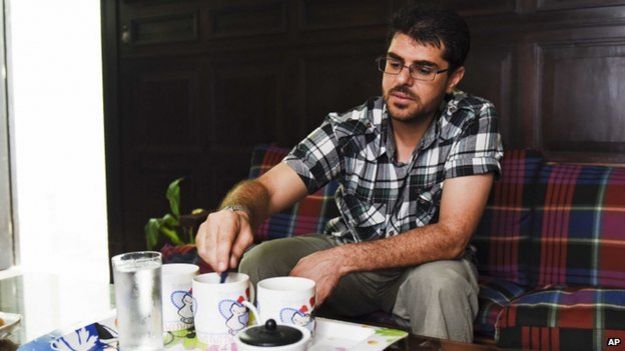Uruguay will no longer grant asylum to Guantanamo prisoners
 Abu Wael Dhiab went to Argentina in February to campaign for the release of all Guantanamo detainees
Abu Wael Dhiab went to Argentina in February to campaign for the release of all Guantanamo detaineesThe new Uruguayan government says it will no longer grant asylum to prisoners from the Guantanamo Bay detention centre.
In December, Uruguay gave sanctuary to six Arab men who had been held at the US base in Cuba for 12 years.
Opinion polls said most Uruguayans rejected the decision taken by outgoing President Jose Mujica.
Foreign Minister Rodolfo Nin Novoa also said Uruguay would stop taking refugees from the Syrian conflict.
Were it not for Uruguay, I would still be in the black hole in Cuba todayAbdelhadi Faraj, Former Guantanamo detainee
Decisions on accepting new refugees from Syria will be put on hold "just until the end of the year," Mr Nin Novoa said.
Uruguay has faced "cultural and infrastructure" problems to deal with the Syrian families, he explained.
Local media has reported several alleged incidents of domestic violence involving Syrian refugees.
'Clearly struggling'
The six former inmates are Abu Wael Dhiab, Ali Husain Shaaban, Ahmed Adnan Ajuri, and Abdelhadi Faraj from Syria; Palestinian Mohammed Abdullah Taha Mattan, and Adel bin Muhammad El Ouerghi from Tunisia.
Mr Mujica, who led Uruguay from March 2010 until March 2015, said they had been subjected to "an atrocious kidnapping".
They spent 12 years in jail for alleged ties with al-Qaeda but were never charged.
 Five of the former detainees in the apartment they share in Montevideo: Adel bin Muhammad El Ouerghi, Ali Husain Shaaban, Abdelhadi Faraj, Ahmed Adnan Ajuri and Mohammed Abdullah Taha Mattan
Five of the former detainees in the apartment they share in Montevideo: Adel bin Muhammad El Ouerghi, Ali Husain Shaaban, Abdelhadi Faraj, Ahmed Adnan Ajuri and Mohammed Abdullah Taha Mattan Abdelhadi Faraj says they are still dealing with serious health issues
Abdelhadi Faraj says they are still dealing with serious health issuesMr Nin Novoa, who took up his post as foreign minister on 1 March, did not elaborate on the change of policy towards Guantanamo detainees.
But in February, Mr Mujica said that the six Arab refugees had not as yet adapted to life in the South American nation.
"They are clearly struggling with the [Spanish] language," he said after paying a visit to the six men.
"They've had problems adapting here, not only because they come from different cultures but also because they bear the scars of living for so many years in isolation and in inhospitable conditions."
'Black hole'
In Latin America, El Salvador is the only other country to have given Guantanamo prisoners sanctuary, taking two in 2012.
One of the former detainees, Abdelhadi Faraj, published an open letter through his lawyer in New York thanking Mr Mujica for his decision to grant them asylum.
 Guantanamo began receiving prisoners from the United States's "war on terror" in 2002
Guantanamo began receiving prisoners from the United States's "war on terror" in 2002"Were it not for Uruguay, I would still be in the black hole in Cuba today," he said.
More than 120 detainees remain in the US-run prison.
Mr Mujica, a former guerrilla leader who spent time in jail during Uruguayan military rule, offered asylum as "a humanitarian gesture".
Under Uruguay's constitution, the president cannot serve two consecutive terms in office, so Mr Mujica did not run in the 2014 election.
He has been succeeded in office by his party's candidate, Tabare Vazquez, who was sworn in on 1 March.
Comments
Post a Comment